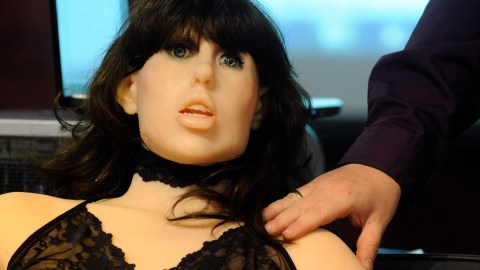Will sexbots devalue our human relationships?

Sex robots are in the works and, as with any new topic concerning sex, it has some people alarmed. Namely, how it might unbalance human relationships and objectify women and children. A group of scientists have made their position clear in an anti-sexbot letter, titled The Asymmetrical ‘Relationship’: Parallels Between Prostitution and the Development of Sex Robots.
Dr. Kathleen Richardson, a robot ethicist at the De Montfort University in Leicester, believes this technology will not benefit society, but will continue to facilitate inequalities between men and women. “If anything the development of sex robots will further reinforce relations of power that do not recognise both parties as human subjects.”
“[T]he development of sex robots will further reinforce relations of power that do not recognise both parties as human subjects.”
“We believe that sex robots reflect relations in the real human world and that the more they are developed and legitimised, the more they will reinforce the real experiences that women have in the real world,” Richardson said in an interview with Broadly. “They will contribute and add to that exploitation.”
The group asserts that these sex-bots will disrupt traditional relationships, hindering our capacity for empathy “that can only be developed by an experience of mutual relationship.” They worry their development will only “further reinforce power relations of inequality and violence.” But this argument has been heard before, numerous times over in arguments against new ideas and developments in human sexuality.
[S]ex-bots will disrupt traditional relationships, hindering our capacity for empathy “that can only be developed by an experience of mutual relationship.”
Dr. Kate Devlin, a senior computing lecturer at the University of Goldsmiths in London thinks this whole campaign “reeks of moral panic.”
She said in an interview with Broadly:
“The tone of the campaign suggests women are passive and denies them sexual agency by presuming that a) we would not want these sex robots to be in our image (fair enough) and b) that we don’t want own sex robots made for our own pleasure.”
We are far from getting the Jude Law sexbot depicted in Stephen Spielberg’s movie AI; according to theoretical physicist Lawrence Krauss — we can hardly get a robot to fold laundry properly.
As for how society will change when the sexbot revolution comes, we cannot know. The future of its use and how it will affect us is difficult to predict.
—
Natalie has been writing professionally for about 6 years. After graduating from Ithaca College with a degree in Feature Writing, she snagged a job at PCMag.com where she had the opportunity to review all the latest consumer gadgets. Since then she has become a writer for hire, freelancing for various websites. In her spare time, you may find her riding her motorcycle, reading YA novels, hiking, or playing video games. Follow her on Twitter: @nat_schumaker
Photo Credit: Ethan Miller / Getty Staff





